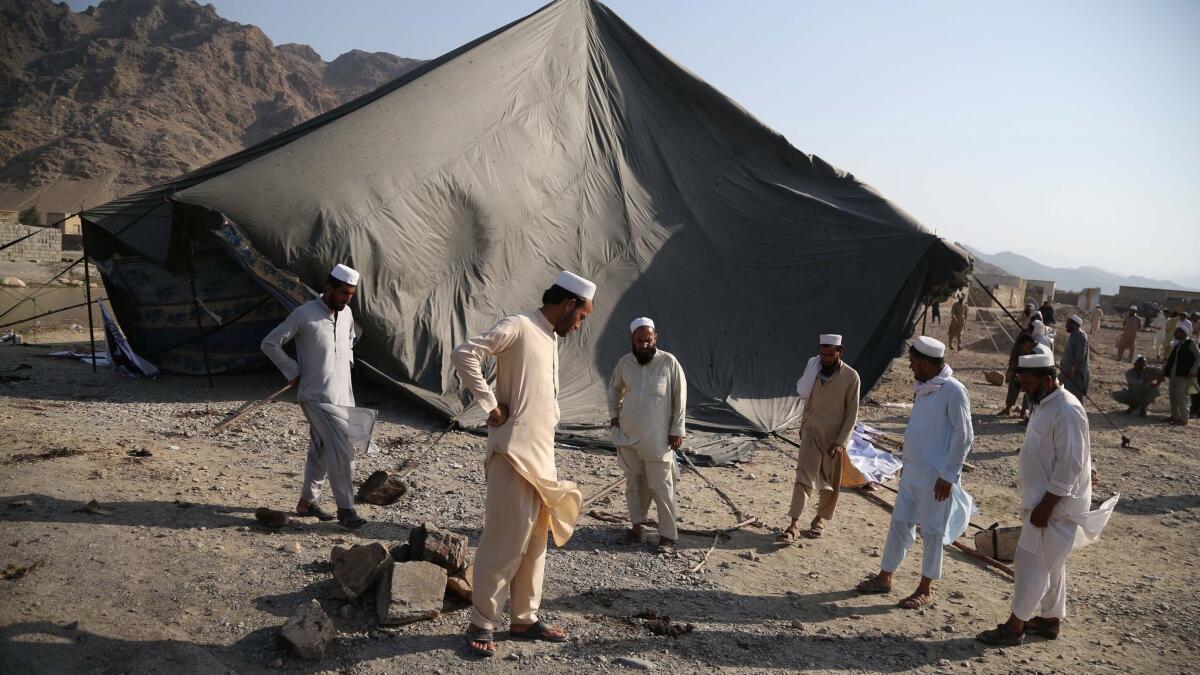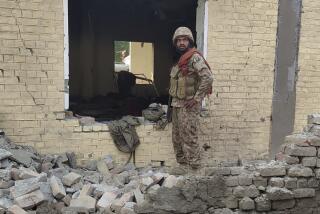Suicide attack in Afghanistan raises new questions about strength of government, U.S.-led forces

- Share via
Reporting from Kabul, Afghanistan — A suicide bomber targeted a protest rally in eastern Afghanistan on Tuesday, killing more than 30 civilians, officials said, in the latest wave of spiraling violence in the country.
The strike intensified questions about the ability of the government and the efficiency of U.S.-led troops who have been stationed in Afghanistan in response to the Sept. 11, 2001, attacks, which were carried out by Al Qaeda, the terrorist network then based in the country.
Nearly 130 other civilians were hurt in Tuesday’s strike, which occurred outside Jalalabad, the capital of Nangarhar province, near the border with Pakistan.
The provincial public health chief, Najibullah Kamawal, said 32 dead and 128 wounded were transported to hospitals in Nangarhar.
In addition, some people at the scene immediately recovered the bodies of their relatives, he said, “so the fatalities may go up.”
Ahmed Ali Hazrat, who heads the Nangarhar provincial council, also said the death toll may rise, as some of the wounded were in critical condition.
Hazrat said the protesters moved on to their rally even after the attack. Officials said several hundred people gathered to complain about a local police commander by blocking the main highway between Jalalabad and the Torkham crossing on the border with Pakistan.
“We are fed up with insecurity,” he said. “Attacks occur every day. And the government doesn’t pay attention.”
Hours earlier, several small explosions occurred near schools in various parts of Jalalabad, which has been the focus of deadly strikes by affiliates of the militant group Islamic State in recent months. A 14-year-old student was killed, and at least four people were wounded in the first attack, officials said.
The Taliban, the main insurgent group fighting the Afghan government and foreign troops, distanced itself from the blasts.
No other group asserted responsibility for any of Tuesday’s bombings.
In a statement, embattled President Ashraf Ghani condemned Tuesday’s suicide bombing.
“The enemies of Afghanistan through such savagery cannot weaken the will of our people for a bright future and a stable country,” he said.
On Sunday, Islamic State said one of its suicide bombers struck a convoy of gunmen who took to the streets in Kabul, the Afghan capital, for hours to commemorate the anniversary of the death of legendary anti-Taliban commander Ahmed Shah Massoud. The gunmen fired indiscriminately, mostly into the air, during the tribute to Massoud, disrupting the lives of tens of thousands of people. Seven people in the convoy were killed and more than 20 wounded in the Islamic State attack, officials said. Massoud was assassinated by Al Qaeda operatives posing as journalists on Sept. 9, 2001, in a resistance stronghold in northern Afghanistan.
Islamic State also claimed to have been behind two apparently coordinated attacks in which more than 20 people, including two Afghan journalists, were killed last week in a largely Shiite Muslim part of the capital.
The Islamic State attacks have deepened concern about already poor security as the resurgent Taliban makes inroads in some areas of northern Afghanistan. The group had no influence in those areas even when it was in power from 1996 to 2001, when it was ousted by Afghan resistance forces and U.S. airstrikes.
More than 150 government security personnel have died in attacks by Taliban militants in northern areas since Sunday, according to local officials.
The Taliban advances and the surge in attacks have also raised more skepticism about the government’s ability to hold long-delayed parliamentary elections scheduled for next month, followed by a presidential vote in April.
In general, the violence has drawn relatively little attention in the West, in part because it hardly affects U.S. or NATO troops in Afghanistan.
But Afghans routinely ask why the United States, 17 years after it intervened in their country, has not managed to secure Afghanistan.
Salahuddin writes for the Washington Post. The Post’s Sharif Hassan contributed to this report.
More to Read
Sign up for Essential California
The most important California stories and recommendations in your inbox every morning.
You may occasionally receive promotional content from the Los Angeles Times.













